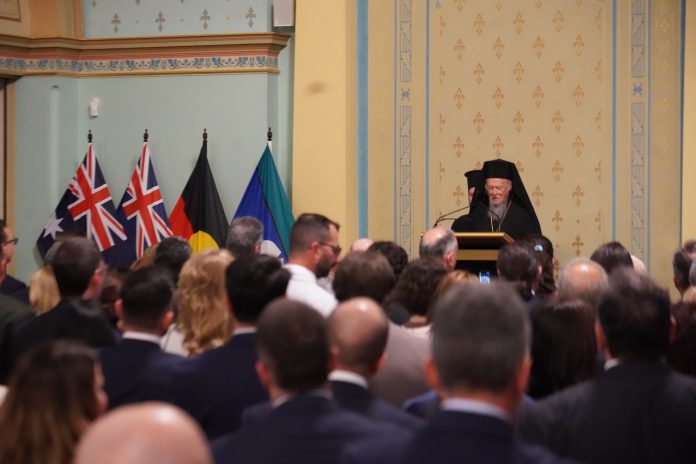Η Α.Θ. Παναγιότης ο Οικουμενικός Πατριάρχης κ.κ. Βαρθολομαίος, το απόγευμα της Τρίτης, 15 Οκτωβρίου 2024, είχε κατ’ ίδίαν συνάντηση με την Εξοχ. Κυβερνήτρια της Βικτώρια και Εκπρόσωπο του Βασιλικού Στέμματος κ. Margaret Gardner, στην επίσημη έδρα του Κυβερνείου.
Ο Παναγιώτατος, συνοδευόταν από τον Ποιμενάρχη, Σεβ. Αρχιεπίσκοπο Αυστραλίας κ. Μακάριο.
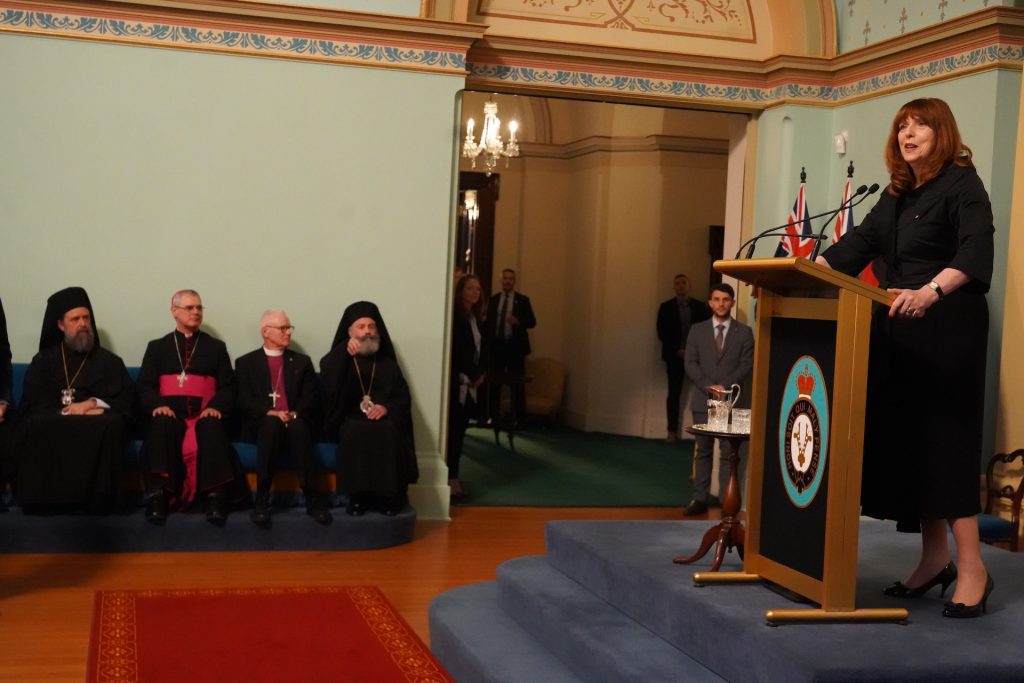
Αμέσως μετά, οι Εξοχώτατες Κυβερνήτρια κ. Gardner και Πρωθυπουργός της Βικτώρια κ. Jacinta Allan παρέθεσαν από κοινού επίσημη δεξίωση προς τιμήν του Παναγιωτάτου, στην οποία παρέστησαν Θρησκευτικοί λειτουργοί, Πολιτικοί, Πανεπιστημιακοί και άλλες προσωπικότητες της Μελβούρνης, πολλοί εκ των οποίων ελληνικής καταγωγής.
Τον Οικουμενικό Πατριάρχη προσφώνησαν και καλωσόρισαν θερμά η Κυβερνήτρια και η Πρωθυπουργός της Βικτώρια.
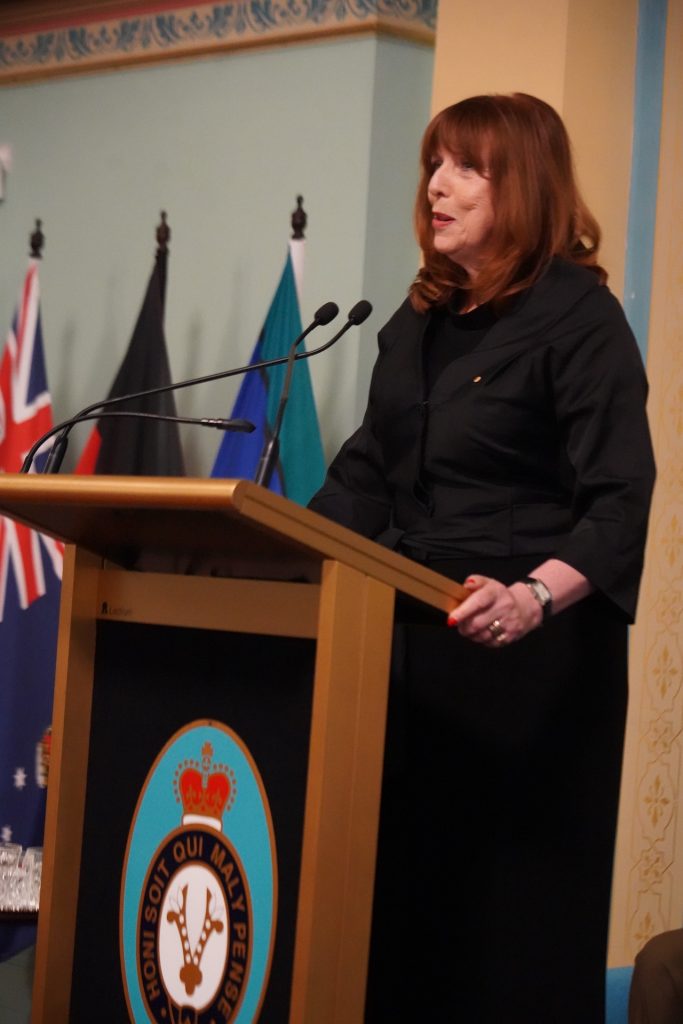
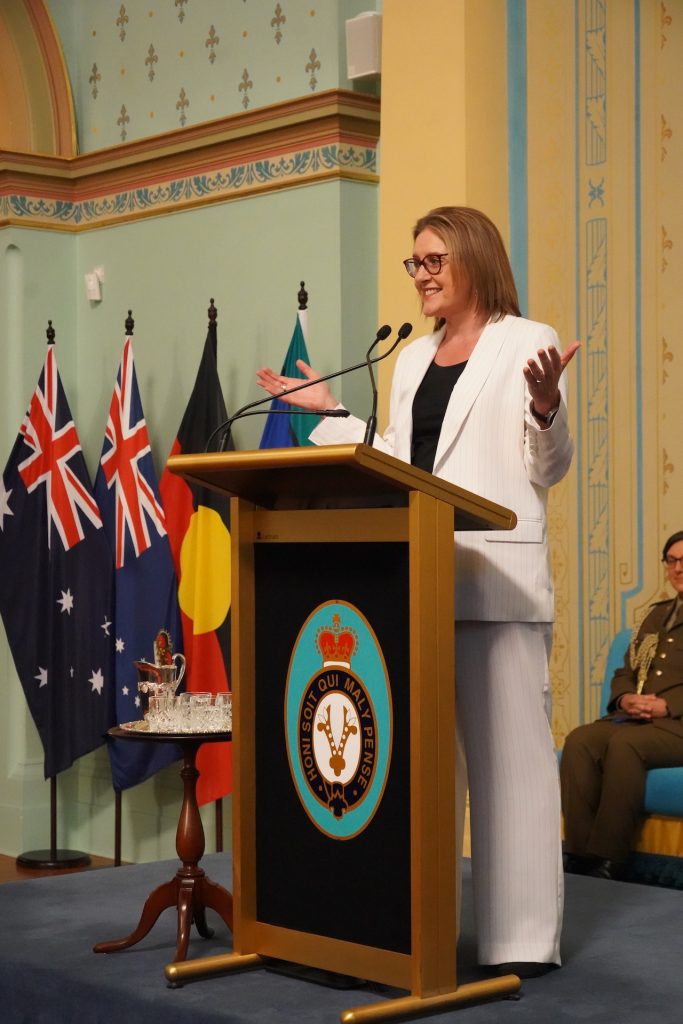
Στην αντιφώνησή του, ο Παναγιώτατος, ευχαρίστησε τις Εξοχώτατες για την υποδοχή και την προς τιμήν του δεξίωση, και στη συνέχεια μίλησε για τον ρόλο της Εκκλησίας στη σύγχρονη κοινωνία. “Μερικοί άνθρωποι πιστεύουν ότι η θρησκεία πρέπει να παραμένει ιδιωτική, μακριά από τη δημόσια ζωή, αλλά η αλήθεια είναι ότι η Εκκλησία έχει την ηθική υποχρέωση να μιλήσει με αναφορά σε ζητήματα που διαμορφώνουν τον κόσμο μας—ιδιαίτερα εκείνα που επηρεάζουν την ανθρώπινη αξιοπρέπεια και δικαιοσύνη.”, είπε ο Παναγιώτατος, και αναφέρθηκε στις διάφορες κρίσεις – περιβαλλοντικές, οικονομικές ή ανθρωπιστικές – και στους πολέμους που συγκλονίζουν τον κόσμο, τονίζοντας ότι η Εκκλησία δεν μπορεί να μένει σιωπηλή μπροστά στην αδικία.
Φωτό: Νίκος Παπαχρήστου
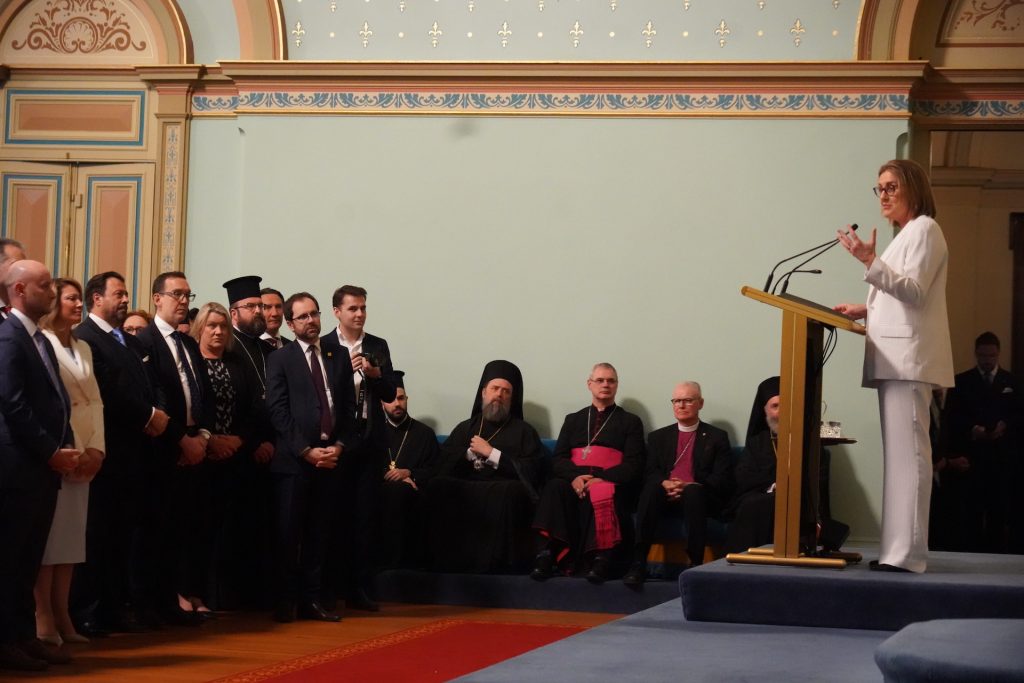
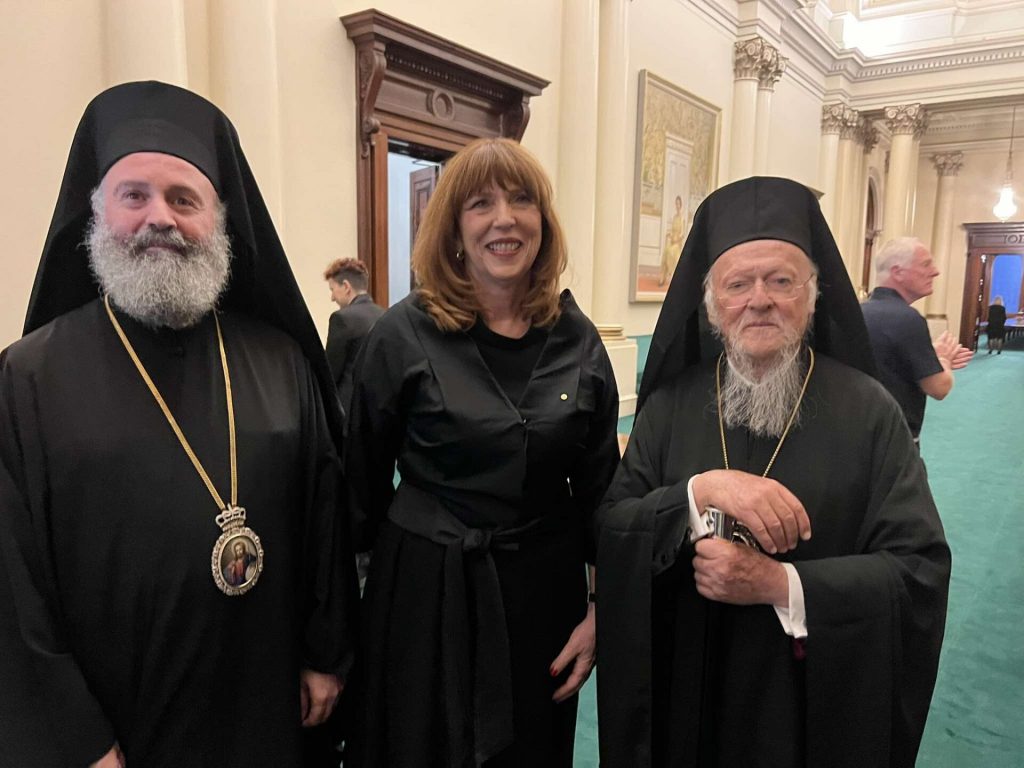
ADDRESS by His All-Holiness Ecumenical Patriarch BARTHOLOMEW during the Official Reception at Government House – Melbourne [Tuesday 15th October 2024]
Your Eminence Archbishop Makarios of Australia,
Your Excellency Professor the Honourable Margaret Gardner AC, Governor of Victoria,
Your Excellency Honourable Jacinta Allan Premier of Victoria,
Distinguished Guests,
Ladies and gentlemen,
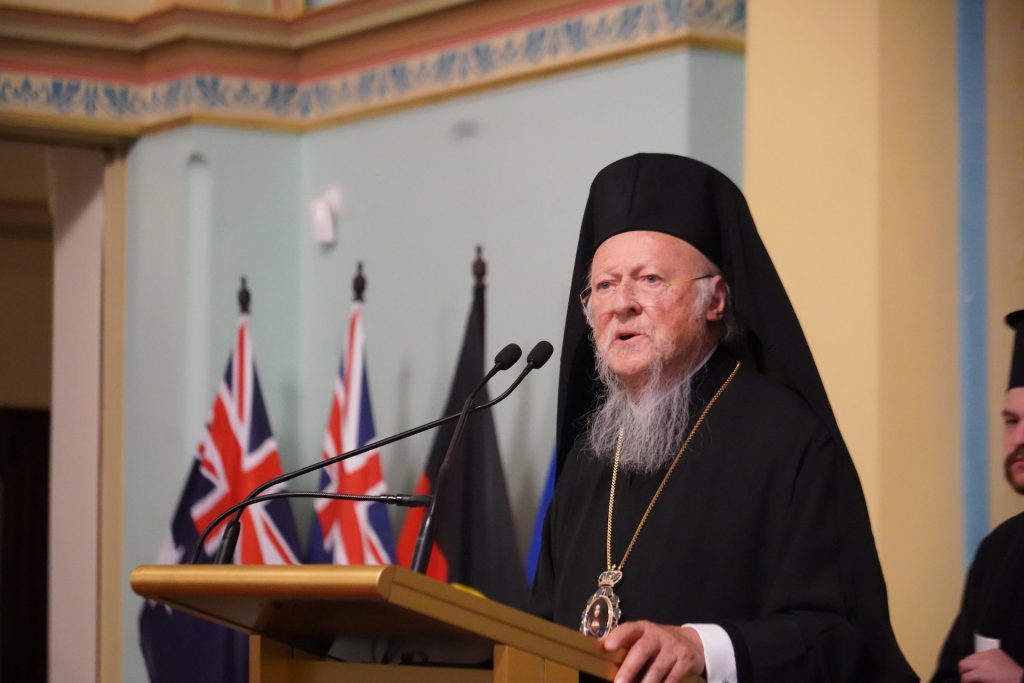
It is a profound honour to be here in the vibrant state of Victoria, at Government House – Melbourne, where the spirit of togetherness and multiculturalism thrives. The rich social fabric of this State truly reflects the beauty of humanity’s shared existence. We are deeply moved by the warmth of your hospitality and the gracious reception extended to us by the people of this great State, a testament to the values of respect and unity that define Victoria, and in which we gather today.
We extend our heartfelt gratitude to Your Excellency and the State Government for hosting this event, and to the Australian Government for inviting us as their honoured guests. We also express our deep appreciation to His Eminence Archbishop Makarios of Australia, whose pastoral leadership and tireless efforts have made this visit possible. His work, both within the Church and in the broader Australian community, stands as a beacon of hope in an increasingly fragmented world.
Tonight, we would like to reflect on the role of the Church in contemporary society, as this is doubted more and more. Some people believe that religion should stay private, away from public life, but the truth is, the Church has a moral obligation to speak with reference to issues shaping our world—particularly those that affect human dignity and justice.
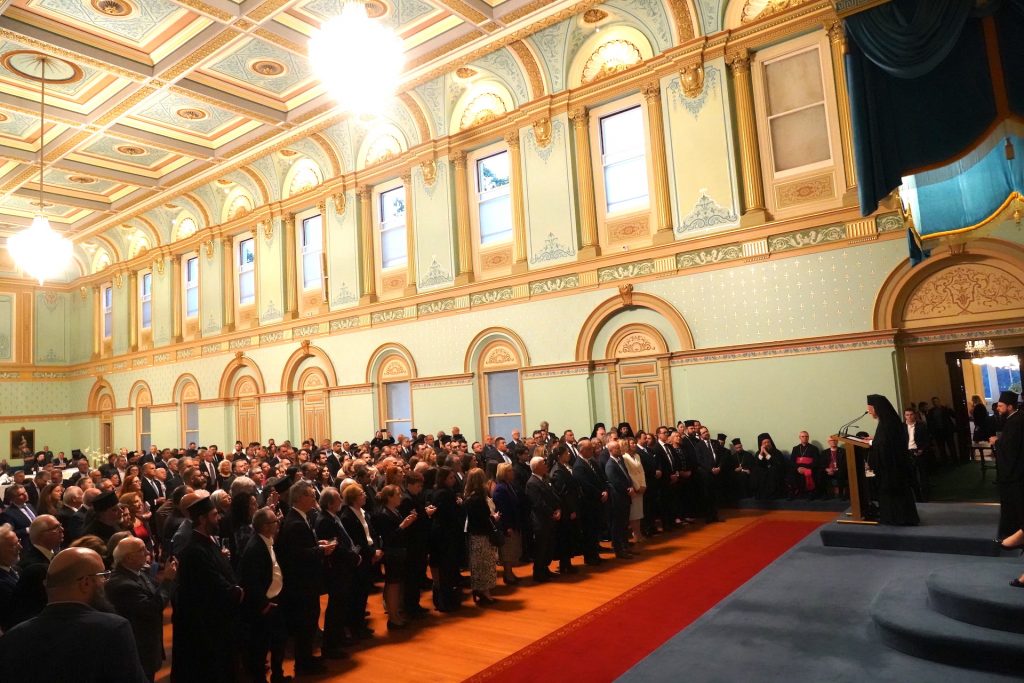
One of the most urgent concerns today is the interconnectedness of human suffering.The crises we face—whether they are environmental, economic, or humanitarian—are all linked by a common thread: the erosion of human dignity. We see this clearly in the devastating conflicts that continue to plague our world, such as the war in Ukraine and the ongoing violence in the Middle East. These conflicts have led to immense human suffering, displacement, and a refugee crisis on a scale not seen since the Second World War. The Church cannot and will not remain silent in the face of such profound hardship and injustice.
Throughout our 33 years as Ecumenical Patriarch, together with the hierarchs and clerics of the Holy Great Church of Christ, we have remained committed to addressing these global challenges, particularly the ecological crisis and its deep connection to poverty and inequality. We have long advocated for environmental stewardship, recognizing that the way we treat the natural world reflects the state of our relationship with one another and with God. Our planet is facing unprecedented challenges—from climate crisis to the depletion of natural resources—and it is clear that the solutions to these problems must involve more than just scientific and technological innovation. They require a radical transformation in the way we live and relate to the world around us.
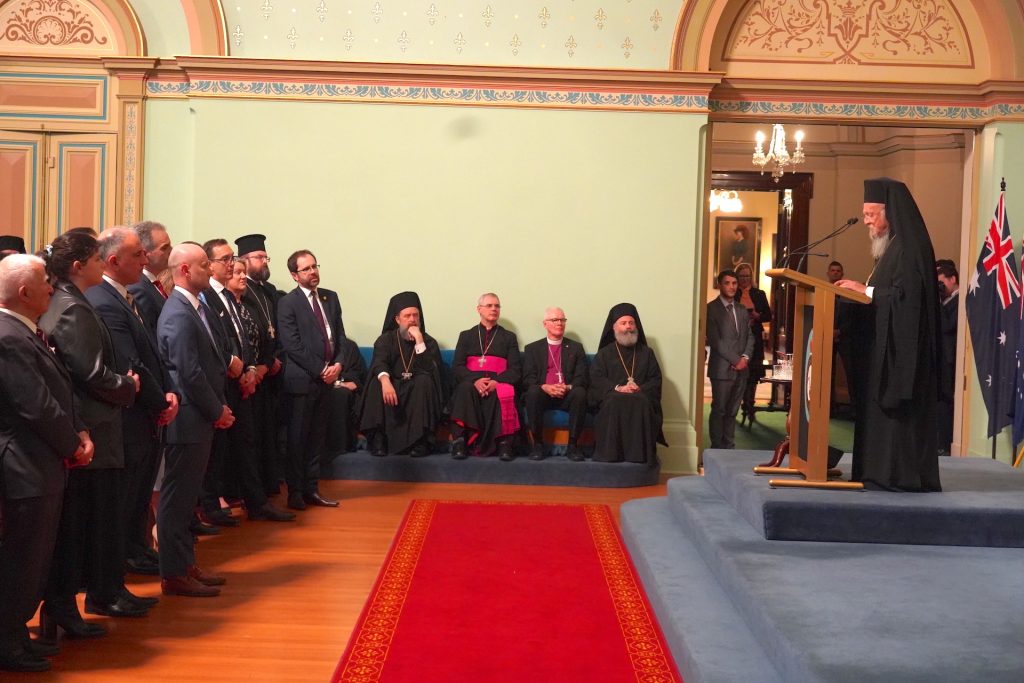
The human person is more than an economic entity, a mere ‘homo oeconomicus’. The contemporary world often makes the mistake of identifying human beings solely with their capacity to consume, their acquisition of wealth, or their material success. The Church has always stood in opposition to such reductionism. Human life, in its fullness, is a gift from God, and the value of a human being is far greater than what they own or accumulate. In the face of consumerism, the Church calls for a deeper reflection on the nature of human existence, one that emphasizes being, over having, and sharing, over hoarding.
One of the key documents produced by the Holy and Great Council of the Orthodox Church (Crete, 2016) was titled “The Mission of the Orthodox Church in Today’s World.” This document affirmed the Church’s commitment to human dignity, justice, and the protection of creation. It highlighted the need for a culture of solidarity—one that transcends borders and brings people together to address the common challenges of our time.
The Church, therefore, has a crucial role to play in fostering this culture of solidarity. We are called to be a voice for the voiceless, to stand with the oppressed and marginalized, and to work for the common good. This includes advocating for the protection of human rights, the alleviation of poverty, and the promotion of peace and reconciliation. In this respect, the Orthodox Church seeks to collaborate with all people of goodwill, regardless of their faith or cultural background, to build a more just and compassionate world.
At the heart of the Church’s mission is the belief that every human being is created in the image and likeness of God, endowed with inherent dignity and worth. This theological foundation compels us to reject all forms of discrimination, violence, and exploitation. It also calls us to promote a culture of care and responsibility, where the needs of the vulnerable are prioritized, and where we recognize our shared responsibility for the well-being of creation.
Indeed, the ecological crisis is not just an environmental issue; it is a moral and spiritual challenge that touches the core of our humanity. As human beings, we are entrusted with the care of the earth, and it is our duty to preserve it for future generations. In the Orthodox tradition, this is expressed through the concept of asceticism—a way of life that rejects selfishness and consumerism in favour of simplicity and respect for all of creation.
The Church also plays a vital role in addressing the growing crisis of isolation and loneliness in our society. In an age of unprecedented technological advancement, we find ourselves more connected than ever before, yet many people feel increasingly isolated and disconnected from their communities. The Church’s mission is to offer a sense of belonging and communion, where individuals are not defined by their material possessions or social status, but by their inherent worth as children of God.
Our Liturgy reminds us that we are all part of a larger whole—a community of believers united by our shared faith and our common humanity. Indeed, as St. Paul reminds us, “If one member of the body suffers, all suffer together with it; if one member is honoured, all rejoice together with it” (1 Cor. 12:26). It is this sense of communion that the Church seeks to promote, both within its own ranks and in the broader society. The Church’s call to “go forth in peace” at the end of every Eucharistic service is a call to action, urging the faithful to bring the peace, love, and solidarity experienced in worship into the world.
As we gather here today in Melbourne, we are reminded of the power of unity and the importance of working together for the common good. The challenges we face—whether they are related to war, poverty, or the environment—cannot be solved by any one nation, organization, or community acting alone. We are all in this together, and it is only through collaboration and mutual respect that we can hope to build a better future for all.
In closing, we extend our heartfelt thanks to Your Excellency, who represents His Majesty King Charles III, to the local and federal government and to the people of Victoria for the warm welcome and generous hospitality. It is our prayer that this land may continue to flourish, that its rich multicultural heritage may be celebrated, and that the spirit of unity, peace, and solidarity will guide all of your endeavours. May God bless you and your families, and may He grant us all the strength to work together for the well-being of humankind and for the integrity of creation, our irreplaceable common home.

